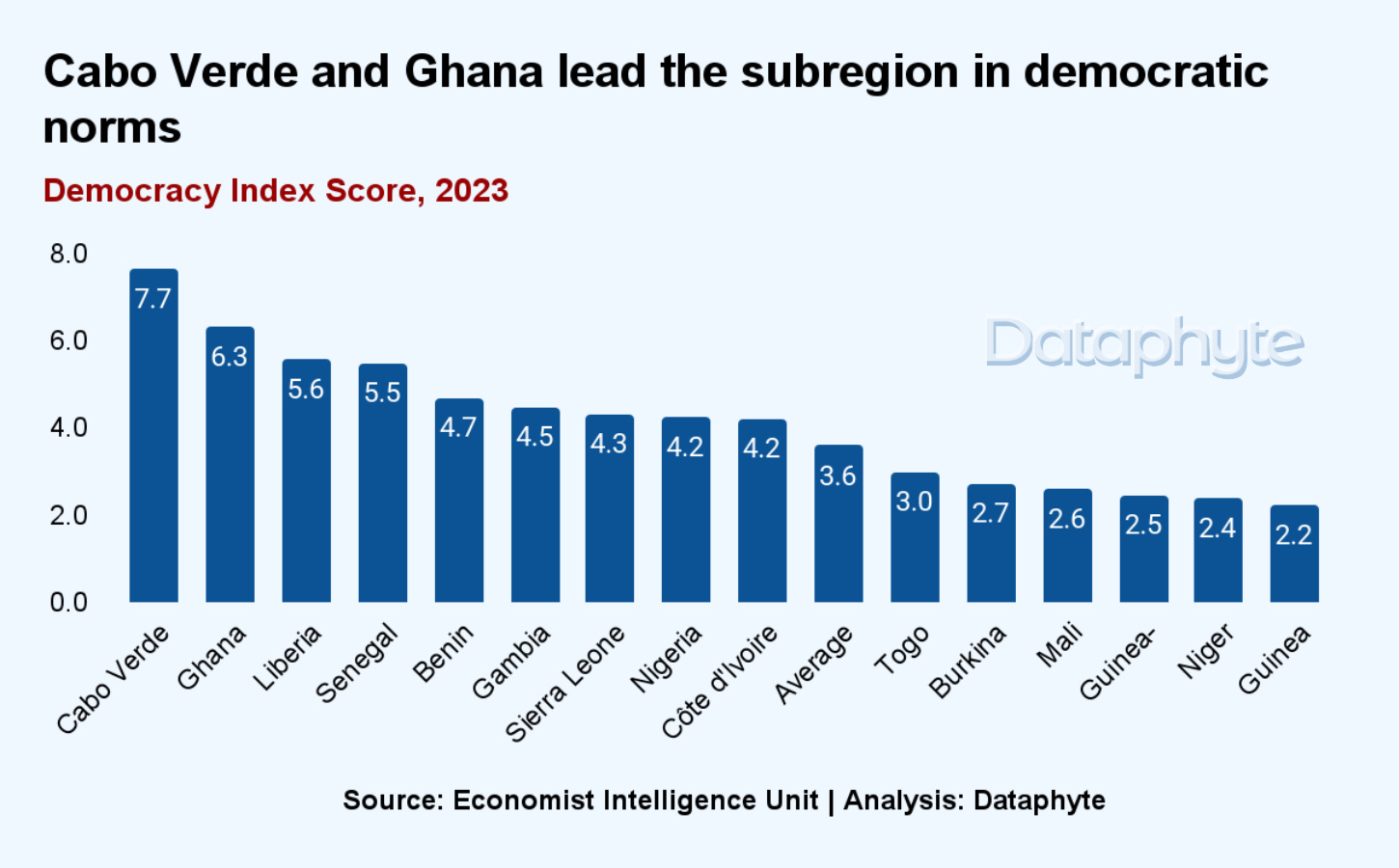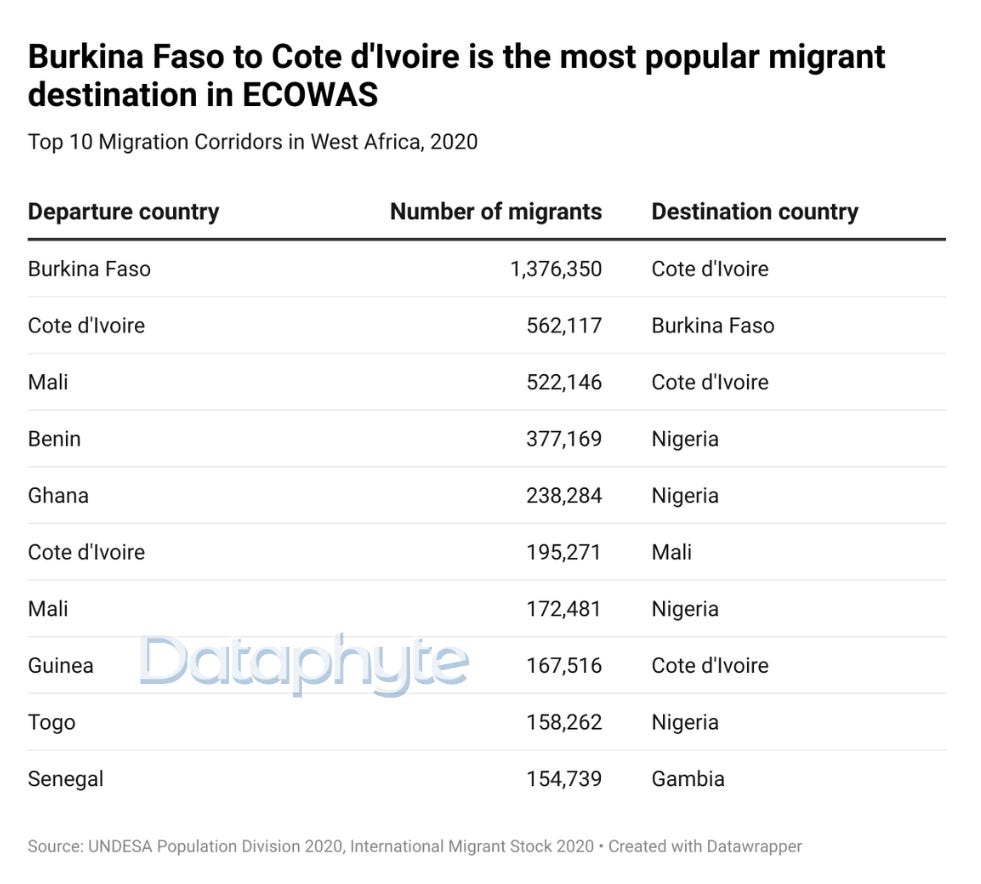ECOWAS at 50, minus three
Having formally put in their notice of withdrawal from the Economic Community of West African States (ECOWAS) in January 2024, the withdrawal of three Sahelian States: Mali, Niger and Burkina Faso will be official on January 29, 2025.
Given that this is coming only four months before ECOWAS celebrates its 50th anniversary on May 28, 2025, this is a blow to the regional body, with economic, geopolitical and security implications. Those implications will be discussed in more detail in a webinar hosted by Dataphyte on Wednesday, Jan 29, 2025 at 11am. You can register here.
For the purposes of this week’s Data Dive, let us look at ECOWAS at 50 across a range of metrics.
We begin with GDP.
GDP and GDP per capita
Nigeria is the 300-pound gorilla as far as ECOWAS is concerned, accounting for over half of its GDP, which means that its economy — in terms of the total income from production of all goods and services in the country — is bigger than all the other ECOWAS countries combined. Cote d’Ivoire, Ghana and Senegal are a distant 2nd, 3rd and 4th respectively.
However, Nigeria looks less impressive when you look at its GDP per capita — the average income of each person in the country. In that measure, it ranks only 5th behind Cabo Verde with a GDP of only $2.6 billion, a rounding error compared to Nigeria – as well as Cote d’Ivoire, Ghana and Senegal. The reason for this is not only due to Nigeria’s huge population (more on that soon) but also because GDP growth has not kept up with population growth. In essence, Nigeria’s economy has barely grown in the last ten years, leading to a lost decade for the country.
Also of note here is that Mali, Niger and Burkina Faso who are set to leave ECOWAS in a few days, all have GDP per capita of less than $1,000, making them among the poorest countries in the world. That level of poverty means that it seems odd to leave a regional bloc that prioritizes free movement of people and goods, except the country’s economy does not rely heavily on the other countries in the region.
Population
As Nigeria dominates in terms of GDP, so it does in population, also accounting for over half of the regional population. Ghana and Cote d’Ivoire are a distant 2nd and 3rd respectively, and Niger Republic is 4th. Cabo Verde has the lowest population in ECOWAS with less than 600,000 people on the island nation. Coincidentally, its GDP per capita is the highest in ECOWAS at nearly $5,000 per person.
Total Fertility Rate
Beyond just population, we have to look at how fast a population is increasing. One way to know this is known as its total fertility rate (TFR) which is defined by demographers as the total number of children a woman is expected to have over her lifetime. On this measure, Niger, Nigeria’s neighbour to the north, has not just the highest total fertility rate in West Africa, but the highest rate in the world at 6.1 births per woman. Mali follows closely behind at 5.6 births per woman, while Burkina Faso’s TFR is 4.2 children per woman.
Consequently, Niger and Mali have some of the highest population growth rates in the world at 3.3% and 3.1% respectively. This means that their populations are expected to double in roughly 24 years. When you consider that both countries are already some of the poorest countries in the world, beset by both economic and security problems, the question must be asked of its leaders if this is the right time to pull their countries out of a regional grouping that aims to bring them prosperity - but failed so far.
More broadly, of the 40 countries in the world with the highest population growth rates, 36 are in Africa. This is according to the United Nations World Population Prospects 2024 report.
Contributions to ECOWAS
In keeping with its economic size, Nigeria is by far the largest contributor to ECOWAS. This study notes In the 12 years between 2003 and 2015, Nigeria contributed $710,497,352, which is more than the combined contribution of 13 member states – Mali, Benin, Cote d'Ivoire, Burkina Faso, Gambia, Niger, Cabo Verde, Guinea Bissau, Liberia, Togo, Guinea, Senegal and Sierra Leone – which contributed $697.947 million during the same period. There is a debate in some circles about whether Nigeria is getting benefits from ECOWAS that are commensurate with its funding of the organisation.
Democracy Score
Democracy has been in retreat in West Africa - and globally - over the last few years. In West Africa, this democratic backsliding has shown up in the resurgence of military coups since 2021, with Mali, Niger and Burkina Faso now being led by military regimes and on the verge of an exit from ECOWAS. It has also shown up in unconstitutional tenure elongations by civilian presidents.
However, there are some positive signs. Cabo Verde, Ghana and Liberia continue to lead the way as concerns democratic norms. In Liberia in 2023, then incumbent George Weah conceded defeat in a very close election, while in December 2023, the then ruling NPP in Ghana lost the general elections in what was essentially a landslide to the opposition NDC.
In Senegal, then opposition party PASTEF won the elections in March 2024, before securing a supermajority in the Senegalese parliamentary elections in October 2024.
Multidimensional Poverty
While the dominant measure of poverty involves the monetary calculation, that is, the number of people who earns less than a certain amount of money per day, there has been a broadening of the definition of poverty to include access to services like education, healthcare and nutritious meals. Enter the multidimensional poverty that aims to include these other examples of deprivation in order to arrive at a complete picture of poverty.
In ECOWAS, the poverty picture is stark. 91% of Nigeriens are already living in multidimensional poverty, which means that those being born will have a lack of options. Mali and Burkina Faso, fellow ECO-exit members, have similarly high poverty levels. At 50 years old, ECOWAS states have an average poverty rate of 54%. A lot of the work over the next 50 years must be to sharply reduce this number.
Conflict Incidence
With poverty and deprivation tends to come conflict and state fragility. The Fragile States Index attempts to measure the fragility of states across a number of dimensions, like security apparatus, the state of public services, state legitimacy, human rights, demographic pressures and so on.
Here too, ECOWAS countries are at or near the top, with Mali, Nigeria and Guinea, Niger and Burkina Faso in the top 21 most fragile states on earth. It is hoped that the situation in these countries does not get any worse, as it will lead to yet more instability.
Trade
Trade is a vital part of regional integration, and the trade as a percentage of GDP measure is a good indicator of trade openness. Cabo Verde leads the region here, with Guinea and Senegal in 2nd and 3rd place respectively. At the other end is Niger. Curiously, Liberia and Nigeria did not have data in the World Development Indicators dataset.
In recent times, Nigeria has proved to be an impediment to trade in the subregion, with the Buhari administration closing the borders in August 2019 under the pretext of curbing smuggling. The closure lasted over 18 months.
Migration
One of the key features of ECOWAS is free movement of people and goods, a freedom that Mali, Burkina Faso and Niger may find harder to enjoy once their exit is finalised. Analysis from the UN’s Department for Economic and Social Affairs indicates that Cote d’Ivoire and Nigeria are the top destinations for West African migrants. In fact, migrant flows from Burkina Faso and Mali into Cote d’Ivoire are two of the top three destinations for migrants in the region.
Exiting ECOWAS will mean that nationals from these three countries, already struggling to make ends meet, would find that their lives have been made that little bit harder.
Remittances
With migration comes remittances, and countries rely on remittances to varying degrees. At one extreme you have Gambia, which relies on remittances for a whooping 22% of its GDP, while in Benin Republic and Cote d’Ivoire it only accounts for 1%.
In absolute terms, Nigeria once again takes the prize for remittances in the subregion, accounting for 61% of the ECOWAS total. Not only does Nigeria rank 1st in ECOWAS, it also ranks 10th globally with $19.5 billion in remittances in 2023.
Conclusion
As it gets ready to mark its 50th anniversary, ECOWAS is a region beset by poverty and insecurity, while dealing with a very young and fast growing population. It is in a race against time to provide adequate opportunities for this population to become productive and prosperous, while battling new headwinds as a result of a new era of geopolitical competition and protectionism.
The quest for deeper regional integration and a keen sense of what ECOWAS countries can offer the wider world, as individual countries and as a bloc, should guide the actions of all heads of state in the region. Their ability to provide a better life for their people - and thus stave off unrest - depends on it.
If you've read this far, now take 2 seconds to share:
Invite your friends and earn rewards
If you enjoy Data Dive, share it with your friends and earn rewards when they subscribe.














